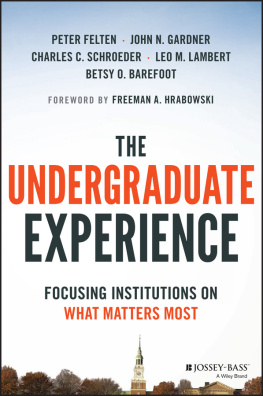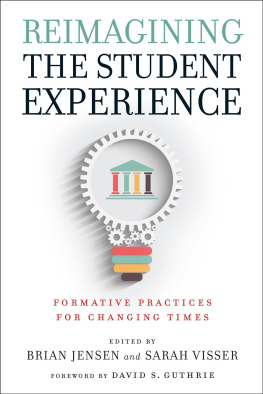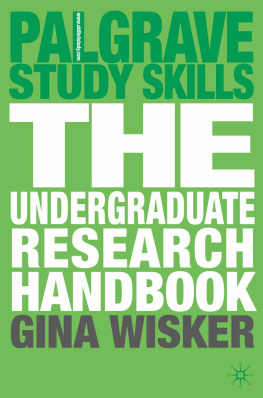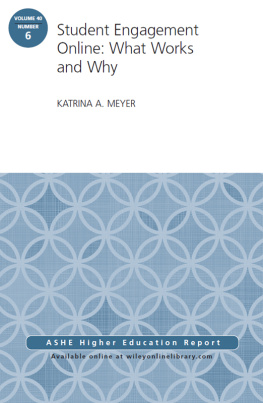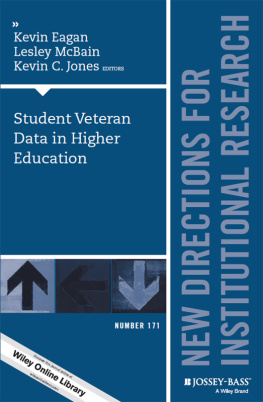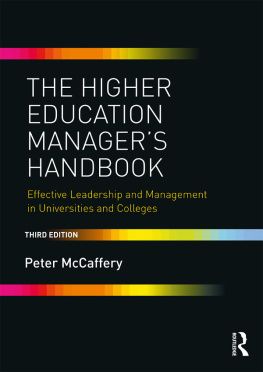
Copyright 2016 by John Wiley & Sons, Inc. All rights reserved.
Published by Jossey-Bass
A Wiley Brand
One Montgomery Street, Suite 1000, San Francisco, CA 94104-4594 www.josseybass.com
No part of this publication may be reproduced, stored in a retrieval system, or transmitted in any form or by any means, electronic, mechanical, photocopying, recording, scanning, or otherwise, except as permitted under Section 107 or 108 of the 1976 United States Copyright Act, without either the prior written permission of the publisher, or authorization through payment of the appropriate per-copy fee to the Copyright Clearance Center, Inc., 222 Rosewood Drive, Danvers, MA 01923, 978-750-8400, fax 978-646-8600, or on the Web at www.copyright.com. Requests to the publisher for permission should be addressed to the Permissions Department, John Wiley & Sons, Inc., 111 River Street, Hoboken, NJ 07030, 201-748-6011, fax 201-748-6008, or online at www.wiley.com/go/permissions.
Limit of Liability/Disclaimer of Warranty: While the publisher and author have used their best efforts in preparing this book, they make no representations or warranties with respect to the accuracy or completeness of the contents of this book and specifically disclaim any implied warranties of merchantability or fitness for a particular purpose. No warranty may be created or extended by sales representatives or written sales materials. The advice and strategies contained herein may not be suitable for your situation. You should consult with a professional where appropriate. Neither the publisher nor author shall be liable for any loss of profit or any other commercial damages, including but not limited to special, incidental, consequential, or other damages. Readers should be aware that Internet Web sites offered as citations and/or sources for further information may have changed or disappeared between the time this was written and when it is read.
Jossey-Bass books and products are available through most bookstores. To contact Jossey-Bass directly call our Customer Care Department within the U.S. at 800-956-7739, outside the U.S. at 317-572-3986, or fax 317-572-4002.
Wiley publishes in a variety of print and electronic formats and by print-on-demand. Some material included with standard print versions of this book may not be included in e-books or in print-on-demand. If this book refers to media such as a CD or DVD that is not included in the version you purchased, you may download this material at http://booksupport.wiley.com. For more information about Wiley products, visit www.wiley.com.
Library of Congress Cataloging-in-Publication Data available at:
ISBN 978-1-119-05074-2 (Hardcover)
ISBN 978-1-119-05122-0 (ePDF)
ISBN 978-1-119-05119-0 (ePub)
Cover design by Wiley
Cover image: Macduff Everton/Getty Images, Inc. and AlinaMD/iStockphoto
Foreword
College and university leaders who seek to enhance the student experience will find this book especially uplifting because the authors are leaders in their own right, with deep experience and success in setting visions, developing plans, and reaching goals. These are can-do, get-it-done educators.
Even more important, the authors are leaders who understand that moving a college or university forward is not about one person but rather about a community and the culture of the institution. In fact, what comes through as one reads the illustrations in this book and absorbs their lessons is that the substance of an institution's culture is particularly critical to what we can achieve. Many institutions talk about supporting all students and about being mission driven. However, institutions that are most effective are those that foster broad agreement on priorities, allow people to ask questions and take initiative, and offer incentives and rewards to those who innovate.
The book provides excellent examples of colleges and universities staying true to their missionscontinually evolving and innovating to ensure success in those missions. In fact, the authors place positive restlessness at the center of successful institutional leadership. This is the notion, outlined by George Kuh and colleagues in 2010, that one must be constantly seeking and striving to improve, determined not to be satisfied and not to say, Been there, done that. On my campus, my colleagues constantly remark that success is never final. We use data analytics and focus groups to gather deep information on issues that arise; ask difficult questions about our assumptions and the data; involve faculty, staff, and students in these conversations; and develop strategies that are critical to constant improvement.
Some readers may be bothered by the book authors' assertion that money is not everything. Yet many will be convinced by the argument that although funding is always necessary, its even more important to make the best use of those funds and to think carefully about the priorities that must be protected. It really is true that during times of scarcity, enlightened institutions can become more imaginative in their spending. The question is, what are the priorities that are most critical to carrying out the mission of the institution? The book addresses the fundamental question of how to use funds not just to make incremental changes but also to transform the institution in ways that can be sustained.
It is sometimes very easy for leaders to become discouraged by forces beyond their control, whether by trends in state and federal policies and funding or the demands of boards, elected officials, and alumni. For leaders who find themselves discouraged because of external constituents and forces, the authors argue that the focus must be on controlling the things that we have the power to control, starting with the work we do to carry out our fundamental missions: promoting student learning and ensuring the quality of the student experience. They argue that leaders at multiple levels have a major impact on the quality of the undergraduate experienceespecially if they pay attention to students, understand their backgrounds, and align the culture of the institution with the students it serves.
They also go beyond the typical discussion involving retention and graduation rates to challenge us to focus on the undergraduate experience. Of course, like money, retention and completion are very important, but the authors are correct that the essence of education is about more than keeping students in college. It is about learning how to learn, asking good questions, analyzing data and information, putting whatever is going on in the world into perspective, and making sound, informed decisions.
Each chapter provides examples that bring these issues to life and give them new meaning. Educators often talk about caring about all students. This book is different because it acknowledges that one-size-fits-all strategies for learning seldom work, yet that certain principles of learning can be applied effectively to meet the needs of all students from all backgrounds at all types of institutions. Here is where the authors deliver at the very practical level. For example, they note the challenges students face when they lack the financial resources to participate in enriching extracurricular experiences, such as study abroad programs. Readers will find the practical discussion of linking budgets with priorities especially helpful as a means for supporting students and institutions.
Leaderspresent and futureinterested in enhancing the student experience will be challenged to think about their own visions and goals in relation to strategic planning, developing priorities, budgeting, and other institutional functions. The authors also address a number of other critical leadership issues, including strengthening communication across campus and nurturing relationships among key constituents of the institution. One essential characteristic of a healthy institutional culture is the extent to which the climate encourages transparency and honest dialogue. The very meaning of shared governance involves cooperation and collaboration among the different groups at the institution.
Next page
